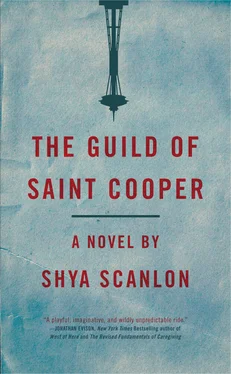We climbed down and I stood sweating in the sun while Kent parked the truck across the street. He grabbed some tools from the bench seat and, as he passed me, dropped some kind of pamphlet at my feet.
“Will you get that?” he asked.
It was a do-it-yourself manual from Home Despot: Roofing for Assholes .
I picked it up and flipped to the end.
It was nearly noon, and Blake was on the back porch in a standing bow-pulling pose. She looked like a tilted martini glass, her head an olive, her bright red face…a pimiento? I’d tried doing yoga with her back at the beginning, but instead of the euphoria it seemed to create in her, in me it just triggered rage.
She looked up, caught me staring at her from inside, and smiled.
“Join me!” she called.
“You won’t like me when I’m angry.”
Blake hadn’t wanted to come to Seattle, but after just a few months here she’d seemed to have a modest awakening. Nowhere was the crude little boil, the clenched fist New York City could turn her into. Somehow, despite the threat and confusion around us, she’d managed to relax. Still, she’d come on the condition that it would only be until we could convince my mother to leave, and since that wasn’t going to happen I worried that every day would be our last.
“Where’s my mother?” I asked. I’d fallen asleep on the couch, and everyone was gone again.
“Just a second,” said Blake. “Let me check my notes.”
A lawnmower started up nearby. It wasn’t unusual for families to make their property — house, garage, and garden — exceptionally clean before leaving it. I couldn’t tell whether it was out of politeness or pride, or whether it was a final act of affection in the love affair they had with the illusion of perpetuity. Moments later a closer, bigger engine roared to life and the lawnmower music was out-sung. It was Brock. I looked through the window to see him walking around his truck, securing the canvas he’d used to cover the bed. Then he took a backpack from his passenger seat and came over.
“Anyone home?” he called, walking down the driveway.
Blake looked at me, frowning.
“Up here,” she said.
I walked out to the back deck as Brock climbed the steps, and we met in front of a barely dressed Blake, who tried to hold her tree pose.
“Blake,” Brock said, “right?”
“Brock,” said Blake.
Brock reached out and wrapped me in a bear hug. “Man!” he said. “May we live in interesting times!”
Over his shoulder, I could see his truck, at idle, visibly shaking. He gave me a tight squeeze before letting me go and holding out the backpack before him.
“Take it,” he said. “I can’t have it with me over the pass — they got dogs now and they’re stopping people, is what I hear.”
“Dogs?”
“You know, police dogs. They’d smell it.”
I was still holding the pack. I glanced down at it. Brock laughed.
“It ain’t gonna bite you, man. It’s just weed.” He leaned in close and said in a conspiratorial voice, “I thought your mom might be able to use it.”
Blake raised an eyebrow, which I tried to ignore. Brock was just being neighborly.
“She’s actually not home right now,” I said, as if that settled something.
“Damn. Say goodbye to her for me? She’s always been my favorite neighbor. No offense. Tell her she’s in my prayers. It’s a damn shame, her coming down with the big C. They tell me that stuff,” he nodded toward the backpack, “really helps with pain and nausea and whatever.”
Blake dropped her pose, marched over to her purse, and pulled out a cigarette.
At dinner Olivia sat before an untouched plate of instant saag paneer and Crystal looked on bemusedly as Kent used a steak knife to clean beneath his nails. My brother’s wife seemed to find his interest in manual labor curious — not distasteful, exactly, perhaps a little thrilling. But she was a banker’s wife and hadn’t forgotten. Her blond hair was curled into a bun sitting behind her blue eyes and slightly upturned nose. That same nose gave her daughter a slightly prudish expression, I’d always thought, though it could also have been that her prudishness made me look at her nose that way.
Blake was describing the event of the day: Brock’s visit. A gallon-capacity freezer bag full of marijuana sat on the window seat beside the emergency radio, and as Blake spoke we’d all turn to it now and then, as though it were the only evidence of the story’s veracity.
“Which was all well and good,” she was saying, “until he said, and I quote, ‘It’s too bad Rose came down with cancer.’ His words: came down. As if it were a common cold!”
I abandoned the idea of nitpicking over the line, which she’d misremembered.
“He was very nice to have left me his grass, in any case,” my mother said.
“So,” Kent said, “are you going to smoke it?”
My mother reached behind her and brought the bag to the table, then unzipped it and pulled out a bud five inches long to whistles and gasps. No one at the table had smoked pot in several years, to my knowledge, but we all recognized a kind bud.
“I used to buy pot from him,” said Kent. “In middle school.”
Kent’s wife looked alarmed. “Middle school? As in, eighth grade?”
“Well, sixth grade, really.”
“Doesn’t surprise me,” Blake said. “That man clearly has no scruples.”
“That man,” I said, “came over and gave us a very thoughtful gift before leaving. That man took his family out of here before coming back by himself to clear out the house. I’d say we’re talking about a pretty considerate person. Your problems with him are problems of class.”
“Christ,” Blake said, “here we go with the classism. Really, Blake, it’s like poor people would have carte blanche to be creeps if it were up to you. Oh, you’re poor? Please, spit on my food!”
The table was quiet. Olivia asked to be excused and went into the living room to play with an elaborate dollhouse Kent had brought home. The entire backside of it was a door and, strangely, staring through the rooms from behind seemed distinctly creepy, while doing so from the front did not, though in fact it amounted to the same thing.
“Classic,” said Kent.
I laughed. “Always the conflict avoider.”
“Anyway,” he said, “I think we can all agree that Brock’s a little touched. He didn’t leave because of the tsunami, right? He left because of an alien invasion. I mean, by his own admission.”
Brock had indeed described the lights to most of us on several occasions, the lights that had shown up, suspiciously, just before the discovery that the Ross Ice Shelf was in critical condition, near collapse. In an unexpected departure from usual sightings, however, he’d said — to anyone who’d listen — that the lights seemed to come from certain trees.
“Is that a class issue, too?” Blake smiled playfully. She was not picking a fight. Today wouldn’t be our last day.
“That depends,” I said. “Did the aliens leave their home planet of their own accord? Or did the state give them one-way tickets?”
“Planet Giuliani. At least it would be safe to walk the streets.”
“Touché.”
Blake pushed a spongy cube of cheese around on her plate. “Psychologically, it’s interesting to me that someone would find it more palatable to believe in aliens than natural disaster.”
“Aliens are out of your control,” offered Kent.
“But wouldn’t that make it worse?”
I considered this. “They come from trees, right? So part of him is making the link. Aliens are always just a symbol anyway.”
Crystal, who’d been silent most of the evening, pushed her plate two inches forward. “I don’t think it matters why he took his family out of here. Just that he did it.”
Читать дальше












